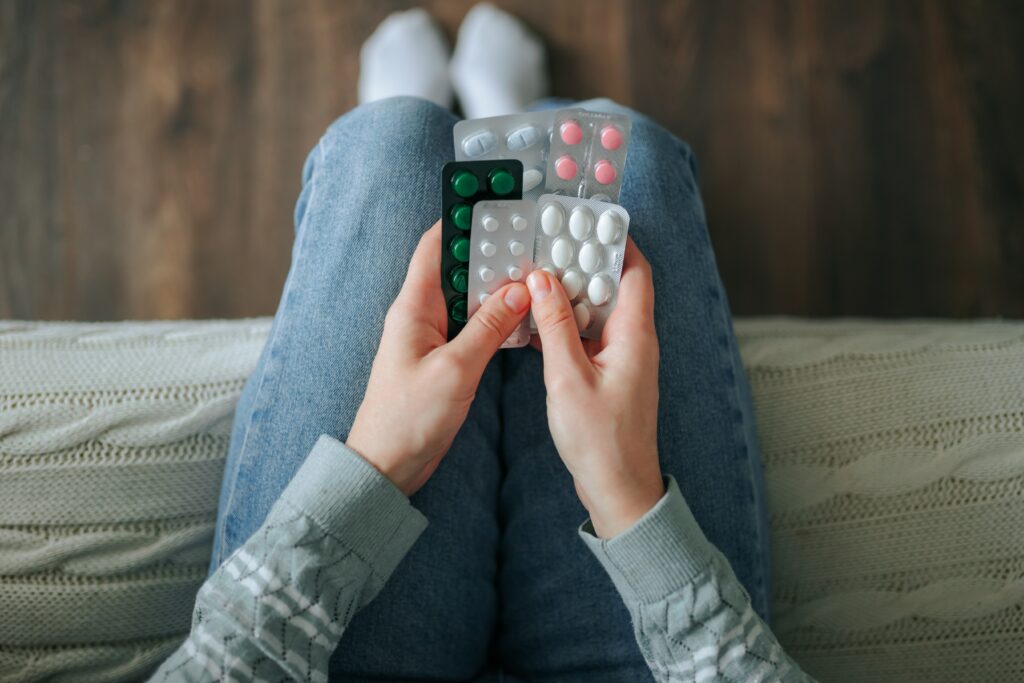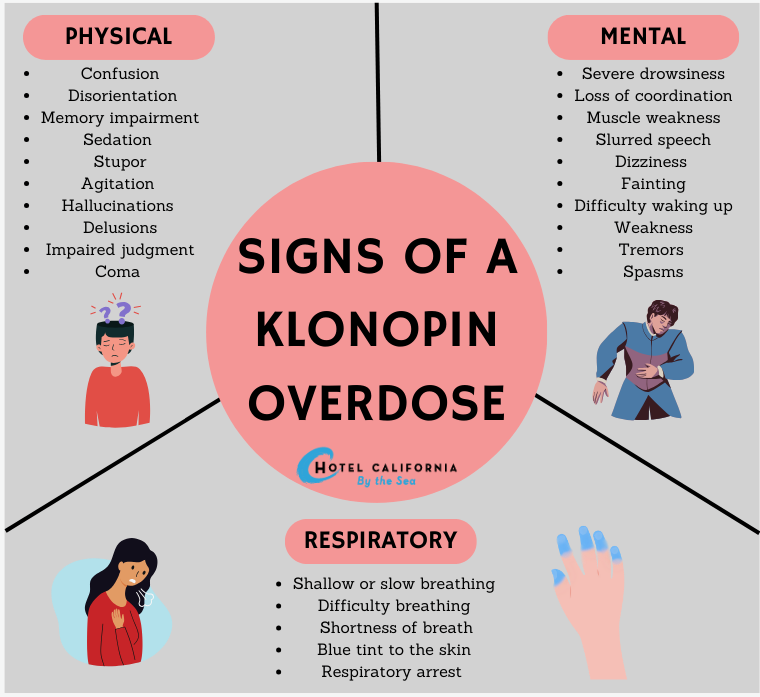What causes a Klonopin OD?
Klonopin is a prescription medication used to treat varying mental health conditions such as anxiety disorders, seizure disorders, panic disorders and agoraphobia disorders. It falls under the substance category of benzodiazepines and is a commonly abused drug. All benzos carry a risk of misuse and dependence. According to the FDA, exposure to benzos can increase a user’s risk of abuse, misuse, addiction and overdose. However, an overdose of the anti-anxiety medication alone is rare. In fact, most cases of Klonopin-related overdose almost always involve other substances or doses that are greater than the maximum recommendation from a medical provider.

Benzos such as Klonopin are effective in providing calming and sedative effects by blocking special receptors in the brain, which can be beneficial for managing sleep disorders or reducing symptoms of anxiety. It is typically prescribed for short-term use only due to its risk for tolerance and dependence which can develop with prolonged use. Dependence on the drug can develop in as little as a few weeks. An addiction can develop even when taken as prescribed by a medical provider.
An estimated 15% of Americans have a bottle of benzos such as Klonopin, in their medicine cabinets at home. And over 18 million people are prescribed Klonopin each year to help them manage anxiety and panic disorders. Despite the popularity of the drug, many people still take the prescription medication incorrectly and are unaware that it can cause addiction and overdose.
How does Klonopin work?
Klonopin is classified as an anticonvulsant and ant-seizure medication. It works by calming down the nerves and brain activity. Klonopin binds to the GABA neurotransmitters in the central nervous system. It suppresses the CNS, which causes the user to relax within the time frame of 30-40 hours. Klonopin is a long-acting benzos that can remain in the body anywhere from 18-50 hours.
The feelings of intense relaxation, mild euphoria and sedation make the drug appealing to those who abuse drugs. This can naturally lead to the development of an addiction. When a person becomes dependent and addicted to a drug, they are unable to naturally produce feelings of relaxation without the presence of the drug. Signs of Klonopin addiction include persistent cravings for the drug, continued use of the drug despite negative consequences, having a desire to quit the drug but being unable to, losing interest in things you once loved and developing financial and legal problems due to drug use.
Many people can develop an addiction to Klonopin without even knowing. Studies found that despite the high addiction rate to the medication, many patients continued to receive prescriptions for Klonopin for months or even years. In general, Klonopin should be prescribed for short-term treatment and this practice can greatly increase a user’s risk of overdose. Research found that taking the drug for longer than four weeks could put you at risk for dependence and developing withdrawal symptoms.

Klonopin OD
The strongest dose of Klonopin pills that are manufactured and distributed in the United States is 2mg. A typical dose of Klonopin is about 0.5mg. The average American adult weighs around 175 lbs. To overdose on Klonopin alone, the average person would need to take about 80,000 Klonopin pills.
Overdosing on Klonopin alone is rare. The risk of overdose significantly increases when Klonopin is taken with other substances, also known as polysubstance use. In fact, it is one of the major causes of Klonopin overdose. The combination of Klonopin with other drugs can lead to amplified and intensified sedative properties. The most common cause of a Klonopin OD occurs when the user is taking it with other drugs such as alcohol or opioids. This often leads to blacking out, respiratory failure and overdose.
According to the National Institute on Drug Abuse, taking opioids with a central nervous system depressant such as Klonopin is most likely to lead to life-threatening symptoms and overdose. A 2020 study found that an estimated 16% of opioid overdose deaths also involved Klonopin.
An overdose occurs when a person consumes more of a substance than their body is able to safely handle. Taking a drug in a different manner in which it was originally intended or recommended by your medical provider can also cause an overdose. Because of this, the body is unable to effectively and safely process and eliminate the substance.
Check Your Insurance Coverage for FREE
Find out if your insurance covers addiction treatment in minutes. We accept most insurance!
Signs and Symptoms of Klonopin OD
- Confusion
- Poor reflexes
- Extreme drowsiness
- Loss of consciousness
- Coma
- Slurred speech
- Unsteady walking
- Reduced attention span
- Memory impairment
- Lack of coordination
- Dizziness and fainting
- Muscle weakness
- Vertigo
- Respiratory depression and respiratory arrest
What to do if you overdose on Klonopin
Though an overdose of Klonopin is rare, it can be fatal if not treated immediately. If you are experiencing an overdose or suspect a loved one of experiencing a Klonopin overdose, call 911 emergency services immediately. At the hospital, medical physicians can clear out the stomach using a device that can remove excess klonopin from the body. In other cases, Klonopin overdose can be treated with Flumazenil therapy. It is a medication used to reduce the sedative effects of benzos such as Klonopin.
Reach out to Hotel California by the Sea
We specialize in treating addiction and other co-occurring disorders, such as PTSD. Our Admissions specialists are available to walk you through the best options for treating your addiction.
Treatment for Substance Use Disorder
Klonopin is a long-acting prescription medication and can remain in the body for a longer period of time compared to other prescription drugs. When the effects begin to wear off, users automatically think the drug has been processed and they begin to take more. This misunderstanding of how long the drug can remain in your system can lead to an increased risk of overdose when too much of the substance has been taken. However, overdose is most likely to occur when Klonopin is being taken with substances such as alcohol, opioids, barbiturates, benzos, street drugs and muscle relaxants. Overdosing on multiple substances is the biggest and most immediate danger of taking Klonopin. In rare cases, medical providers may prescribe more than one benzo at a time. This can lead to adverse reactions, especially overdose.
An addiction to Klonopin often leads to an overdose of the prescription medication. Behavioral health treatment programs such as Hotel California by the Sea can provide the tools, resources and support clients need to overcome their Klonopin addiction. We specialize in treating substance use disorders. We offer all levels of care, which include medical detox, inpatient residential treatment, partial hospitalization program and intensive outpatient program.
Within our program, we utilize evidence-proven treatment methods such as cognitive behavioral therapy, dialectical behavioral therapy and group therapy. Individualized counseling, support group sessions and even one one-on-one time with a case manager can provide significant support for clients in recovery. Hotel California by the Sea is dedicated to helping clients throughout every level of recovery and helping them achieve a sober and happier life.
References:
https://zinniahealth.com/substance-use/clonazepam/overdose
https://npaddictionclinic.com/blog/can-you-overdose-on-klonopin-how-to-save-a-life
https://www.addictioncenter.com/benzodiazepines/klonopin
https://addictionresource.com/drugs/klonopin/overdose
https://www.sprouthealthgroup.com/substances/klonopin-overdose/
